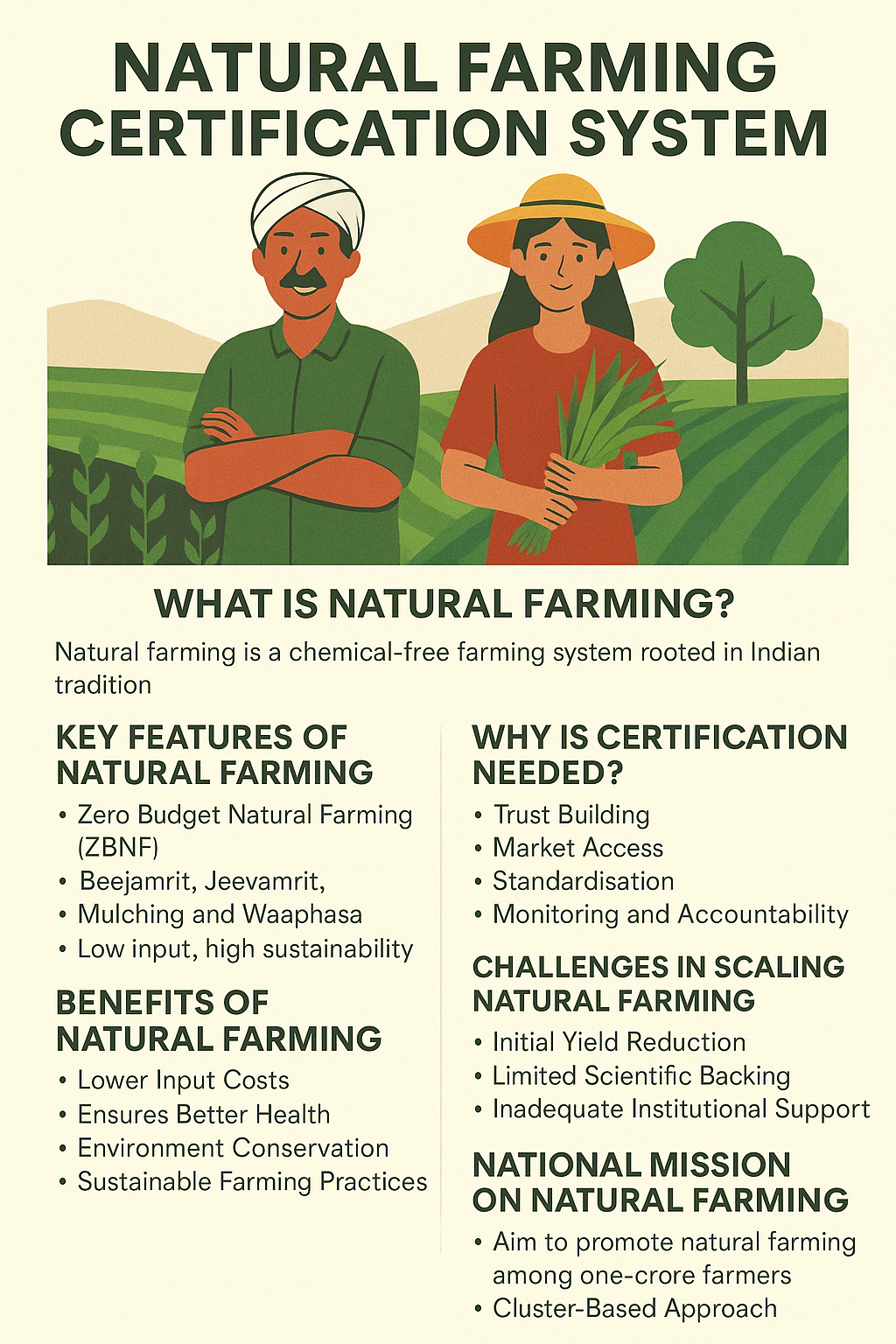
May 16, 2025, Post 1: THE SEAL OF TRUST: India’s Natural Farming Certification System |High Quality Mains Essay | Prelims MCQs
THE SEAL OF TRUST: India’s Natural Farming Certification System

📅 May 16, 2025
🎯 Focus: Agriculture | Sustainability | Certification & Governance
🌱 Opening Whisper
A farmer’s soil speaks truth. A consumer’s hand seeks proof. Now, the nation readies a seal to connect both.
🔍 Key Highlights
- The Government of India is preparing to launch a Natural Farming Certification System (NFCS) to standardize, certify, and promote chemical-free, sustainable farming.
- The move aims to strengthen consumer trust, expand premium markets, and boost farmer incomes.
- Natural Farming relies on:
- Zero Budget Natural Farming (ZBNF) model by Subhash Palekar
- On-farm inputs like Beejamrit (seed treatment), Jeevamrit (soil tonic), Mulching, and Waaphasa (soil aeration)
- No use of synthetic fertilizers or pesticides
- Benefits include:
- Lower input costs for farmers
- Higher nutrition density in crops
- Reduced carbon, nitrogen, and water footprint
- Improved soil biology and agro-biodiversity
📦 Why Certification Matters
- Trust Building: Verifies produce as genuinely natural
- Market Access: Opens domestic and international organic/natural premium markets
- Standardization: Brings consistency across practices
- Monitoring: Ensures traceability and accountability in production
⚠️ Challenges in Scaling
- Initial Yield Drop during transition from conventional farming
- Limited Scientific Data on long-term scalability across agro-climatic zones
- Insufficient Institutional Linkages between research bodies, KVKs, and Panchayats
🛠️ National Mission on Natural Farming (NMNF)
- Goal: One crore farmers to adopt natural farming
- Cluster Model: 15,000 clusters at Gram Panchayat level
- Bio-Input Resource Centres (BRCs): 10,000 planned for easy farmer access
- Model Farms: 2,000 demonstration farms across KVKs and AUs
- Certification & Branding: Central component of mission for better market integration
📚 GS Paper Mapping
| 📘 GS Paper 3 | Agriculture – Sustainable Practices, Organic/Natural Farming, Soil & Water Conservation |
|---|---|
| 📘 GS Paper 2 | Government Schemes – Implementation through Local Governance, Certification Systems |
💭 A Thought Spark — by IAS Monk
When food comes from the earth with reverence, and reaches the plate with trust — that is when farming becomes a whisper between nature and nation.
High Quality Mains Essay For Practice :
Word Limit 1000-1200
“Natural Farming and the Seal of Trust: Toward a Greener Future in Indian Agriculture”
Introduction
India, a land where agriculture has long been revered as both sustenance and sacred practice, is at a crossroads. While the Green Revolution brought food security, it also introduced an overreliance on chemical fertilizers, pesticides, and external inputs — eroding soil health, polluting water systems, and burdening farmers with input costs. As sustainability becomes a non-negotiable goal, the nation turns its attention to an age-old yet forward-looking approach: Natural Farming.
The government’s proposed Natural Farming Certification System (NFCS) is a critical step in mainstreaming this practice. It aims to establish credibility, build market access, and ensure quality control — vital for transforming natural farming from a grassroots movement into a nationwide agricultural paradigm.
What is Natural Farming?
Natural Farming is a chemical-free, resource-recycling, and ecologically balanced system that relies on on-farm inputs instead of synthetic chemicals. It revives traditional Indian wisdom of soil nourishment while incorporating modern ecological science. It minimizes external dependency and emphasizes natural processes like fermentation, microbial action, and soil aeration.
The most recognized model of Natural Farming in India is Zero Budget Natural Farming (ZBNF), promoted by Padma Shri Subhash Palekar. ZBNF focuses on four pillars:
- Beejamrit – A natural seed treatment made from cow dung and urine
- Jeevamrit – A bio-enhancer for soil health
- Mulching – Retaining soil moisture through organic cover
- Waaphasa – Ensuring soil aeration and reducing water usage
Why Natural Farming Now?
With climate change altering rainfall patterns and degrading agricultural land, the need for a low-input, high-resilience model is critical. Natural farming addresses multiple goals:
- Economic: Reduces farmer dependency on expensive fertilizers and pesticides
- Environmental: Enhances soil biodiversity, reduces emissions, and promotes regenerative agriculture
- Health: Eliminates the risk of chemical residues in food and water
- Social: Empowers small and marginal farmers, especially in dryland and tribal areas
Despite these benefits, lack of formal certification has kept its market reach limited and left many farmers without premium returns.
Natural Farming Certification System (NFCS): A Game Changer
Certification is central to the success of natural farming. The proposed Natural Farming Certification System (NFCS) seeks to:
- Authenticate Claims: Ensures consumers can trust that produce is truly chemical-free
- Enable Market Access: Farmers can access niche domestic and export markets demanding verified natural produce
- Ensure Standardization: Brings uniformity in farming practices across states
- Provide Traceability: Ensures accountability through records and audits
- Build Farmer Confidence: Encourages widespread adoption by linking certification with premiums and institutional support
Unlike the complex PGS (Participatory Guarantee System) used in organic farming, NFCS aims to offer a simplified, user-friendly framework suitable for marginal farmers and village clusters.
Key Features of the National Mission on Natural Farming (NMNF)
India has already launched the National Mission on Natural Farming with a vision to convert one crore farmers to natural methods. Key interventions include:
- 15,000 Gram Panchayat Clusters: Promoting local implementation with ownership
- 10,000 Bio-Input Resource Centres (BRCs): Providing essential inputs like jeevamrit, beejamrit, and compost
- 2,000 Model Farms: Training farmers through live demonstration at Krishi Vigyan Kendras (KVKs) and Agricultural Universities
- Farmer Master Trainers: Building local capacity for knowledge transfer
- Certification & Branding: NFCS will form the backbone of the product credibility framework
Benefits of the Certification System
For Farmers:
- Higher market prices for certified produce
- Lower input costs
- Reduced debt due to minimal reliance on external inputs
For Consumers:
- Safer, chemical-free food
- Transparent sourcing and traceability
- Healthier nutritional profiles
For Environment:
- Better soil regeneration and fertility
- Lower water usage and greenhouse gas emissions
- Protection of pollinators and beneficial insects
Challenges in Scaling Natural Farming
Despite its appeal, large-scale adoption of natural farming and the success of NFCS depend on addressing the following concerns:
- Initial Yield Decline: During the transition period, yields may dip temporarily, affecting income. Support mechanisms must bridge this gap.
- Scientific Validation: While anecdotal success is abundant, long-term, peer-reviewed research is still limited.
- Institutional Gaps: Poor coordination between research institutions, extension agencies, and local governments hampers momentum.
- Market Linkages: Certification must be backed by strong branding and market networks to ensure premium realization.
- Awareness & Training: Farmers need ongoing education, not just about techniques but about certification and compliance.
Policy Support and the Way Forward
To address these challenges, a convergence model is needed. The Ministry of Agriculture must work with:
- ICAR and Agricultural Universities for scientific trials and curriculum
- APEDA and MoFPI for export facilitation
- State Governments and Panchayats for implementation and monitoring
- Civil society and farmer collectives for outreach, training, and community support
Digitally-enabled certification and QR-code-based traceability systems can help integrate small producers into high-value supply chains.
Furthermore, integrating natural farming into climate adaptation strategies, water policies, and nutrition programs will make it part of India’s holistic development model.
Conclusion
Natural Farming is not just an agricultural technique; it is a philosophy of living in harmony with nature. As India introduces the Natural Farming Certification System, it plants the seeds of trust — between farmer and consumer, between land and livelihood.
With the right balance of policy, science, and tradition, this movement can redefine how India feeds itself and the world. And when a farmer’s toil is met with a trusted label, agriculture becomes not just productive — but regenerative, inclusive, and ethical.
Target IAS-26: Daily MCQs :
📌 Prelims Practice MCQs
Topic:
Type 1: How many of the above statements are correct?
Consider the following statements regarding Natural Farming in India:
1. Jeevamrit is used in Natural Farming as a soil inoculant made from fermented cow dung and cow urine.
2. The National Mission on Natural Farming aims to reach one crore farmers across India.
3. Certification is necessary to ensure standardized chemical usage in Natural Farming.
4. The proposed Natural Farming Certification System (NFCS) will allow export access and premium pricing for farmers.
How many of the above statements are correct?
A) Only two
B) Only three
C) All four
D) Only one
🌀 Didn’t get it? Click here (▸) for the Correct Answer & Explanation
✅ Correct Answer: B) Only three
🧠 Explanation:
B) Only three
1. ✅ True – Clusters at Gram Panchayat level are used for implementation.
2. ✅ True – The system is entirely chemical-free.
3. ✅ True – These are key ZBNF practices using cow-based inputs.
4. ❌ False – BRCs are for providing bio-inputs, not crop insurance.
Type 2: Two-Statement Check
Consider the following two statements:
1. Jeevamrit and Beejamrit are fermented inputs prepared using cow dung and cow urine.
2. All districts in India have already achieved 100% adoption of natural farming.
Which of the above statements is/are correct?
A) Only 1 is correct
B) Only 2 is correct
C) Both are correct
D) Neither is correct
🌀 Didn’t get it? Click here (▸) for the Correct Answer & Explanation
✅ Correct Answer: A) Only 1 is correct
🧠 Explanation:
A) Only 1 is correct
1. ❌ False – NF is still being adopted gradually; not yet universal.
2. ✅ True – These are key elements in Zero Budget Natural Farming (ZBNF).
Type 3: Code-Based Question
Which of the following practices are associated with Natural Farming?
1. Beejamrit
2. Waaphasa
3. Use of synthetic pesticides
4. Jeevamrit
Select the correct code:
A) 1, 2 and 3 only
B) 2, 3 and 4 only
C) 1, 2 and 4 only
D) All of the above
🌀 Didn’t get it? Click here (▸) for the Correct Answer & Explanation
✅ Correct Answer: C) 1, 2 and 4 only
🧠 Explanation:
C) 1, 2 and 4 only
1.✅ True – Beejamrit is a seed treatment in NF.
2.✅ True – Waaphasa ensures soil aeration.
3.❌ False – Natural Farming prohibits synthetic pesticide use.
4.✅ True – Jeevamrit boosts microbial activity in soil.
Type 4: Direct Factual
Which scheme aims to bring one crore Indian farmers under Natural Farming by 2026?
A) Rashtriya Krishi Vikas Yojana
B) National Mission on Sustainable Agriculture
C) National Mission on Natural Farming
D) Paramparagat Krishi Vikas Yojana
🌀 Didn’t get it? Click here (▸) for the Correct Answer & Explanation.
✅ Correct Answer: C) National Mission on Natural Farming
🧠 Explanation:
C) National Mission on Natural Farming
This scheme is the government’s flagship initiative for promoting natural, chemical-free farming.

















